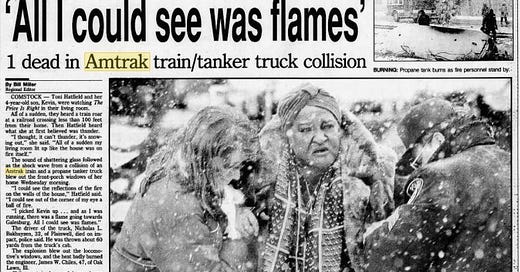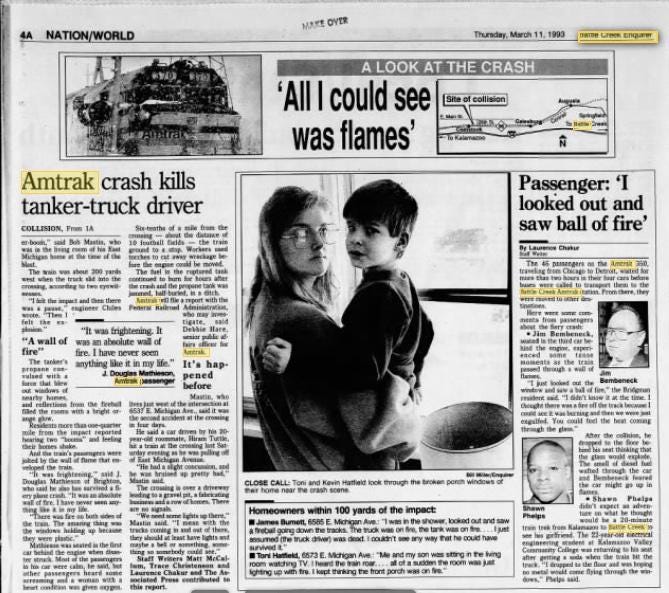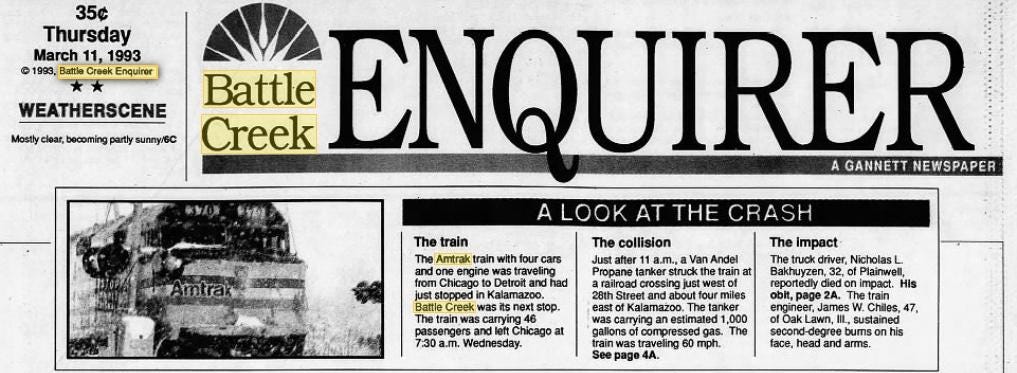The 1993 Comstock, Michigan Amtrak crash. Reaching out, twenty-five years later, hoping to close old wounds.
This piece was originally published on 1/28/2018 on Tribune Media's "ChicagoNow".
This was the second time I wrote publically about the crash. The first time was on March 9, 2015. I shared my third written piece on The Moth stage in February, 2018. Invisible Illness (A Medium Publication) published my fourth piece on April 6, 2021. I wrote a fifth piece about the crash in 2023 on the 30th Anniversary of the accident, March 10, 2023, and published it here on Substack.
I’m mailing the letters tomorrow, and I hope it’s the right thing to do.
Twenty-five years ago, on March 10, 1993, I was involved in an Amtrak crash in Comstock, Michigan. One man, Nicholas Bakhuyzen, was killed. Another man, the train’s engineer, James Chiles, received 2nd-degree burns on his face, head, and arms. Despite Amtrak’s initial reports, several passengers were also injured. All of us were changed forever.
And today, I finally wrote two long-overdue letters — one to Mr. Chiles, thanking him for guiding our train beyond the impact zone after we struck a tanker truck carrying 1000 gallons of compressed gas; the other to a relative of the driver of the truck.
The letters are not long. I did not allow myself to overthink as I wrote. Believe me, I’ve been thinking about these men for 25 years. I just needed to finally write.
It was an icy, snowy Wednesday when our train, Amtrak 350, left Chicago’s Union Station at 7:30 am. There were four cars behind the train’s engine, though I do not recall which of those cars I was in. I remember I was seated on the left side of the car, on the aisle. My boss at the time, Dan, sat next to me, at the window. I was twenty-four years old.
Bound for Detroit, our train had just stopped in Kalamazoo before making a stop in Battle Creek. It was there that Dan and I were to present work for our advertising agency.
According to court records, our train was traveling at 60mph around 11 a.m., four miles east of Kalamazoo, Michigan, when we struck Mr. Bakhuyzen’s vehicle. He’d been a driver for Van Andel L.P. Gas, operating a rig that was only 1/3 of its capacity full of fuel. The collision happened at a private grade crossing, intersecting the tracks and M-96, near milepost 139 in Comstock.
The crossing was known to be dangerous. At the time, there were no signals to alert drivers of oncoming trains. According to the Battle Creek Enquirer, our accident was the second at that crossing in four days.
Reports indicate that Mr. Bakhuyzen’s truck slid down an icy incline, causing him to lose control of the truck when his brakes locked up. We will never know the moment he saw our train coming, or what his thoughts were as he tried to stop his truck.
The train’s Pulse Event Recorder — similar to an airplane’s black box — indicates that our engineer, Mr. Chiles, had been sounding a warning horn for 1/4 mile before the collision. Mr. Chiles reported that he saw Mr. Bakhuyzen’s truck approaching the tracks and that he immediately sounded the train’s horn and applied the brakes, knowing that the truck was not going to stop. I can still hear that horn, which was active at the moment of impact.
When we hit the truck, I also heard the muffled sounds from the impact itself, followed by silence — and then the explosion. But it was the flames and the heat — not those sounds — I remember the most. The sensation of being surrounded by flames — without any idea of what was happening — is something I have worked for a quarter of a century to forget. I am now finally at peace with the fact that I will not.
The explosion blew out windows of nearby homes and businesses, shaking residences up to a quarter mile away. Upon impact, Mr. Bakhuyzen was thrown from his truck. He did not survive the crash. He was only 32 years old.
The engineer, Mr. Chiles, though injured and still applying the brakes, had enough sense to keep the train moving long enough to ensure all of the cars went through and beyond the crash site. Had he stopped too soon, some of us may have stopped in the midst of the burning wreckage. We finally came to a stop “six-tenths of a mile from the crossing — about the distance of 10 football fields.” (Battle Creek Enquirer, March 11, 1993, p. 4A).
After the crash, lawsuits were filed by the estate of the truck driver and one of my fellow passengers against the engineer and Amtrak. To this day, I have not read the judge’s final verdict, nor will any of the results matter to me.
What I know and care about is that the experience changed me in ways I never anticipated. I’m still understanding the scope of the impact, still learning how the cycle of PTSD and trauma affect a person, still trying to find meaning in such tragedy.
For years now, I’ve hoped to connect with Mr. Chiles and the family of Mr. Bakhuyzen. I’ve wanted to thank Mr. Chiles for doing what he could in those horrific circumstances, and to offer my condolences to Mr. Bakhuyzen’s family. Until recently, I’d often think about reaching out, but then I’d chicken out. I had no idea what I’d say. I didn’t want to upset these people any more than they might have one day been. And I was too afraid to open those doors. All I wanted to do was keep them shut.
But when I began to move through some unrelated struggles of my own, I adopted a two-word mantra to keep my chin up, and the memories of the Amtrak crash came back en force. My mantra, “Keep Going”, is in, a way, a metaphor for what the engineer, Mr. Chiles, actually did for his passengers that day. He kept going, even though it was painful. He kept going because it was necessary. And he kept going because it was the only thing to do.
I don’t know how Mr. Chiles did it, and I don’t know how he’s doing now. I sure would like to know, but he may not want to reopen any doors. And, honestly, who on earth could blame him?
I can’t imagine how Mr. Bakhuyzen’s family went on after what happened to him, but I’d still like to let them know that I’ve thought of him — and them — so often…and that I’m sorry.
I don’t know if it’s common to reach out to people in this manner, or if my letters will even open any doors. I don’t want to upset these individuals or reopen their old wounds for the sake of healing mine.
Like the collision itself, we can’t know everything that lies ahead. We can only react to the unforeseen as best we can. And sometimes, as I’ve learned, I just have to follow my gut .. and hold on, as it were, for dear life.







